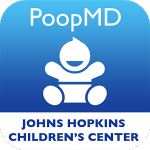 The healthcare app market has boomed in recent years, with apps devised to help us increasingly take control of our own health, but also the health of our dependents.
The healthcare app market has boomed in recent years, with apps devised to help us increasingly take control of our own health, but also the health of our dependents.
One such app is the delightfully named PoopMD (Apple and Android), which allows parents to take a picture of their child’s stool and the app will analyze it for signs of a rare liver disease.
The app, which was documented in a recent study, was found to have an incredibly good track record at identifying bilary atresia (BA), which is a liver disease that affects around 400 babies a year in the US.
“Days matter in diagnosing BA,” the authors, from Johns Hopkins hospital say.
If a child is diagnosed within their first two months of life, they have a good chance of successful treatment without needing a liver transplant.
The authors contend, however, that the disease is often not diagnosed within the optimal 60 day window, with the average time for diagnosis in America being 70 days.
Solid foundations
The researchers believe the solid academic foundations of the app will set it apart from the many thousands of other healthcare apps on the market. It undoubtedly has that, and the success rate of the app is commendable indeed.
The potential benefits of the app are also considerable, with liver transplants costing around $150,000 to carry out, plus an extra $25,000 a year for the immunosuppression that is required to prevent the child from rejecting their new organ.
I get that, but with so many apps on the market it can be incredibly difficult for us as adults, and of course as parents, to choose the right ones. If we begin to look out for each and every thing we can quickly slip into paralysis of choice, and indeed become so paranoid about every little thing that we fail to enjoy raising our little ones.
Maybe if one app could check for multiple diseases that would be a happy medium that gives parents peace of mind without overwhelming them with fear.
With things like the Tricorder X Prize, this is increasingly likely to become a reality, and hopefully some of the entrepreneurs competing in that challenge will take on board the approaches used by PoopMD to incorporate bilary atresia detection into their devices.
Goodness, another app? It's hard enough keeping track of one thing let alone dozens of different apps. Talk about information overload!
I think that is going to be the challenge for many of the health apps entering the market. They all do some great stuff, but add them together and it's an awful lot for the average person to take in.